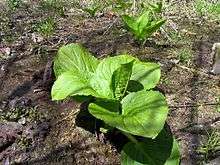dracontium
English

Symplocarpus foetidus leaves out in mid-spring after the flowers have bloomed.
Etymology
From the genus in which Symplocarpus foetidus was formerly classified, Dracontium, from Latin dracontium (“dragon-wort”), from Ancient Greek δρακόντιον (drakóntion).
See also


Latin
Etymology
From Ancient Greek δρακόντιον (drakóntion).
Pronunciation
- (Classical) IPA(key): /draˈkon.ti.um/, [draˈkɔn.ti.ʊ̃]
Noun
dracontium n (genitive dracontiī or dracontī); second declension
- dragonwort; either Dracunculus vulgaris or Arum dracunculus
Declension
Second-declension noun (neuter).
| Case | Singular | Plural |
|---|---|---|
| Nominative | dracontium | dracontia |
| Genitive | dracontiī dracontī1 |
dracontiōrum |
| Dative | dracontiō | dracontiīs |
| Accusative | dracontium | dracontia |
| Ablative | dracontiō | dracontiīs |
| Vocative | dracontium | dracontia |
1Found in older Latin (until the Augustan Age).
Descendants
- English: dracontium
- Translingual: Dracontium
- Spanish: draconcio
References
- dracontium in Charlton T. Lewis and Charles Short (1879) A Latin Dictionary, Oxford: Clarendon Press
- dracontium in Gaffiot, Félix (1934) Dictionnaire Illustré Latin-Français, Hachette
This article is issued from
Wiktionary.
The text is licensed under Creative
Commons - Attribution - Sharealike.
Additional terms may apply for the media files.